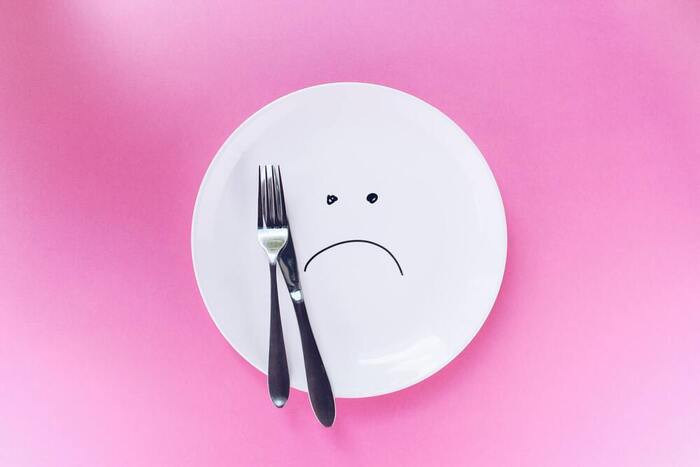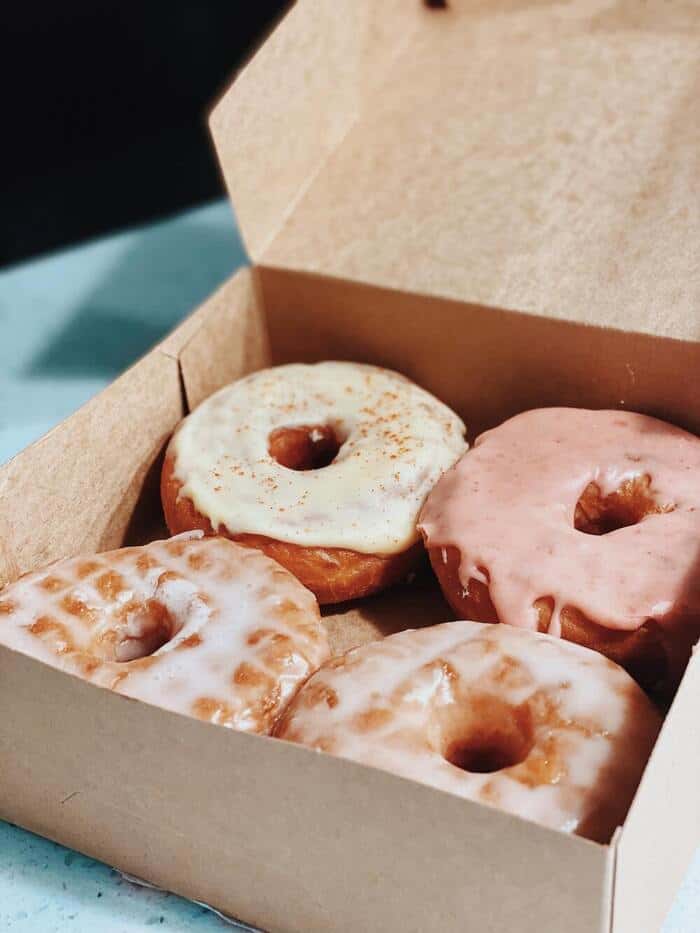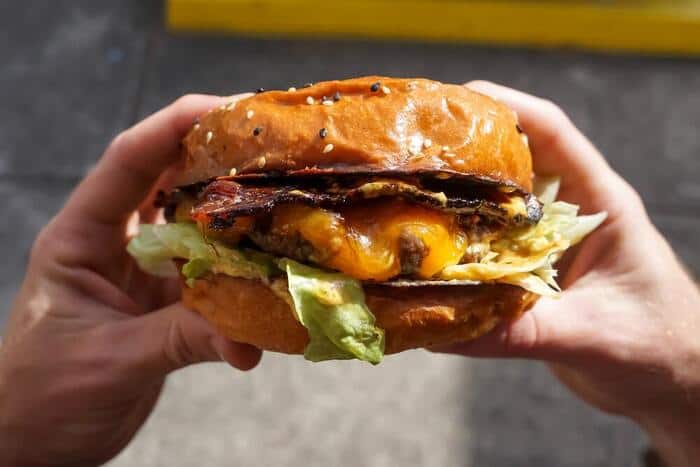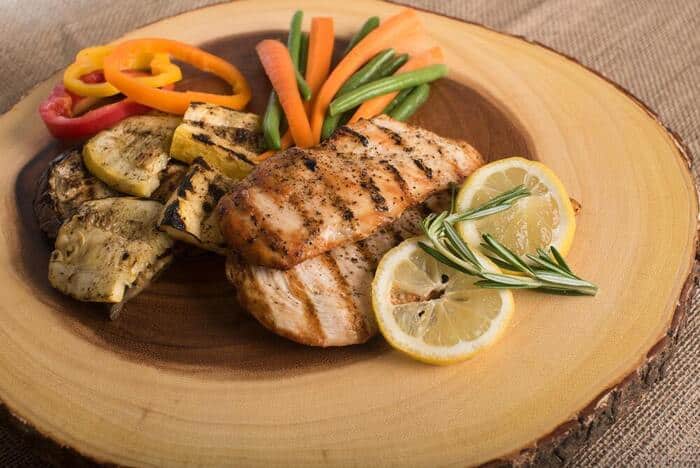When hunger pangs first hit, they can take you by surprise. You’re sitting in a quiet college classroom during a big final or—worse—in an important job interview. Your stomach starts rumbling and the harder you try to get it to shut up, the louder and more demanding it gets.
So, what should you do when your appetite kicks in and you’re struggling to keep the growl of hunger pangs quiet? Should you give in to your cravings or call a doctor? If you’re asking, ‘why am I constantly hungry?’ or ‘why do I have hunger pains after eating’, here’s what the experts have to say about these nasty hunger symptoms.

What are hunger pangs?
Technically, if you’re feeling pain in your stomach when you’re hungry, it’s because stomach acids are attacking the stomach lining, says Sandra Arevalo, director of nutrition services and community outreach at the South Bronx Health Center in New York City.
Some people refer to hunger pangs as ‘hunger pains,’ and it’s not just because the two words sound so similar. When your body is starting to feel hungry, a hormone produced in your stomach and small intestine called ghrelin kicks into play. Dubbed an “appetite increaser” by doctors, ghrelin tells your stomach to release the enzymes that prep it for food. That’s what causes your stomach to sound like the Gremlins from the ’80s horror flick (note the similar name!), and it can get pretty uncomfortable.
Ghrelin tells the stomach to release acids that will break down the food you eat. But if you’re not sending your stomach a hamburger or some cheese for the acids to work on, they have nothing to do but start to go after the lining of your stomach, which may cause stomach pain that feels like hunger but isn’t.

What causes hunger pangs?
1. Hunger (or ghrelin)
True to their name, hunger pangs can be caused by actual hunger. If you don’t stick to a regular eating schedule, your body will eventually protest in the form of a rumbling in the tummy. That’s why we tend to feel hunger pangs when we’re dieting and denying our body the amount of food it’s used to, or when we’re busy and forget (or don’t have time) to eat.
The reason behind hunger pangs is pretty simple: The body uses food for energy. If we don’t supply it with energy, the body warns us that we need to refuel. The hormone ghrelin stimulates our appetite, so we will chow down to satiate it.
2. Eating junk food
Unfortunately, hunger pangs don’t just crop up when our bodies actually need food (aka calories). Ghrelin works hand in hand with insulin, the hormone that the pancreas releases to keep your blood sugar on an even keel. When insulin levels increase, ghrelin tends to decrease. When your insulin levels drop, your ghrelin levels spike. That’s why eating junk food can fill you up for an hour… only for your body to get hit with cravings to eat again, which may result in hunger pains after eating or constant hunger pains in upper stomach.
“If [you’re] eating sugary and highly processed meals, your blood sugar spikes quickly, and your body releases a lot of insulin, which does it job quickly,” explains Melanie Wirth, a registered dietitian with Taher Food Services in Minneapolis, Minnesota. “Then you have a crash!”
In other words, your insulin levels will bottom out, and ghrelin will be released, triggering stomach acids and eventually your appetite, even though you just ate an hour ago.

3. Certain medications and medical conditions
Another reason you might be feeling that ache in your midsection? Some medications, especially antidepressants, can cause ghrelin releases in the body, Arevalo says.
People with diabetes will also experience the highs and lows of ghrelin, because hunger increases when your blood sugar dips.
4. Not getting enough sleep
And if you’re not getting enough sleep, your body may punish you for it. Researchers have found that even a single night of sleep deprivation can make your body kick up the cravings.
Another study from 2016 revealed that lack of sleep contributes to folks being drawn to foods high in sugar, sodium and fat.
5. Dehydration
Thirst can mimic hunger, with your tummy rumbling to tell you it that what it really wants is a glass of water (or six). When was the last time you drank some water? Have you been drinking alcoholic beverages, which tend to be dehydrating?
“A lot of times we feel hungry, but we just have thirst and can’t differentiate,” says Vanessa Rissetto, a registered dietitian from New York City That’s because the symptoms of thirst mimic hunger. You can get shaky, irritable, even have pain in your stomach.
Rissetto recommends you drink a tall glass of water, then wait 20 minutes to see if the pains or food cravings go away. If they do, it’s likely your body was just crying out for water. It’s a good reminder to up your intake.

6. Emotional state
Sometimes the brain will be telling the body it needs to eat, even when the stomach isn’t presenting those hunger pangs. That’s when Arevalo tells her clients to sit down and think about what they’re feeling.
“Are you feeling the desire to eat more as a pain in your stomach or is the pain in your head?” she asks clients. If your stomach is uncomfortable and/or making noises (remember the Gremlins), then it’s probably true hunger. If it’s not, then your brain could just be pushing emotional hunger.
Your mental health can play a role in emotional hunger. Studies have shown that stress, lack of sleep, and other negative experiences can make our bodies feel like they’re in desperate need of food. The difference, however, is that hunger pains that are felt in the stomach indicate your body actually needs food for energy, Arevalo explains. A craving that’s coming from your brain, on the other hand, is purely emotional.
7. Environmental factors
Just smelling something delicious can trick our bodies into thinking we’re hungry, while seeing food on a billboard or in a TV commercial can trigger our appetites (and our salivary glands). The hunger may all be in the brain, but it can certainly feel like we need to eat ASAP, which often leads to overeating.

Symptoms of Hunger
When ghrelin starts doing its dirty work in your belly, the hunger pangs can seem like symptoms of something more insidious. So how do you tell the difference between hunger and something else?
Take note of how you’re feeling overall, says Vanessa Rissetto. “Hunger pangs normally leave you with an empty feeling in your stomach,” she says. Here are some of the common symptoms of hunger.
Lightheadedness
Hunger is often (although not always) accompanied by feelings of lightheadedness or dizziness, which can be related to the insulin crash that your body is experiencing or a lack of energy due to the lack of food to sustain the body’s needs.
Irritability
You may also feel irritable, Arevalo says, hence the popular term “hangry” (a portmanteau of hungry and angry).
Fatigue
Our bodies get the energy we need from nutrient-dense food. If you’re feeling tired, fatigued, or just plain exhausted, this is a common symptom of hunger.

When to See a Doctor
If you’re experiencing nausea, diarrhea and/or fever along with that stomach pain, it’s probably time to pick up the phone and call your doctor. “Hunger will never give you a fever. Hunger will not give you diarrhea,” Arevalo points out.
Even if you have deduced you are hungry (rather than coming down with the gastrointestinal virus that’s been making the rounds at your office), take note of how often you feel hunger pangs. If you experience hunger symptoms often, it’s still important to talk to your doctor.
Frequent hunger issues alone are not normal and could be a sign that you need help. It’s why Arevalo says everyone who is embarking on a diet change should consult with a medical professional who can help them craft a nutritional plan that is right for their body and their needs.
Not trying to change up your diet for a weight loss plan? It’s still important to regulate your meal schedule. Researchers have found that not eating at regular mealtimes doesn’t just cause wacky ghrelin levels; it also causes us to choose foods that aren’t as healthy as the stuff people chow down on when they stick to a schedule.
How to Curb Those Cravings
Once you’ve figured out that you’re hungry—and not just craving that bag of chips in your desk drawer because your boss was acting like a jerk—the obvious fix for hunger pangs is to eat. Right? Hold on just a second. You don’t need to go running for the kitchen, Wirth says. Even hunger pangs aren’t a sign that you need to eat immediately or else.
Instead, you need to take a few minutes to consider your options. When your stomach is growling, your head is dizzy, and you’re feeling cranky, it’s easy to grab junk food. In fact, scientists say we’re more likely to give in to our worst cravings when we’re in the throes of hunger. That’s in part because those foods are fast and easy, but Arevalo says it’s also because of the way our body processes different foods.
The body can digest carbohydrates much more quickly than proteins and fibers, so we tend to crave carbs that will give our hungry body a fast fix. Of course, then there’s the inevitable insulin crash an hour or two later, and the resulting hunger pangs.
If you just ate recently and need to eat something small to quiet your growling stomach or you don’t have time for a full meal, Wirth says you should eat “hearty snacks that include some protein and healthy fats.” Protein-laden eats take longer to digest, which means the stomach will feel fuller longer, and you can avoid that ghrelin release.
Meanwhile, researchers have found that foods high in polyunsaturated fats, such as walnuts and fish, can actually work against ghrelin and suppress appetite. Carbs aren’t completely verboten, but Wirth warns they need to be “complex carbs” like oatmeal or whole grains to “increase satiety and prolong the release of ghrelin.”

Easy (and healthy) snacks for shutting down hunger pangs:
- Baby carrots and hummus
- Nuts
- Veggie smoothies
- Low-fat cheese and an apple
- Black bean dip with sliced sweet peppers
- Soy bean dip with celery sticks
- Apple wedges and peanut butter

Hunger Pangs: The Main Takeaway
Once you know what causes them, avoiding hunger pangs is fairly simple. Talk to your doctor or dietitian about crafting a healthy balanced meal plan and eat at regular intervals instead of skipping meals.
And while it may seem obvious, feeling hunger pangs is just another reminder to avoid junk food whenever possible, lest you get caught up in the vicious cycle of insulin/ghrelin releases.
“The more sugar you eat, the more ghrelin may be released,” Rissetto points out. “Limit your intake of sugar if you are always feeling hungry! If you’re always eating sugar/’junky carbs’ you spike your insulin levels, which ultimately crash quickly, leaving you hungrier than before and craving more junky carbs.”





